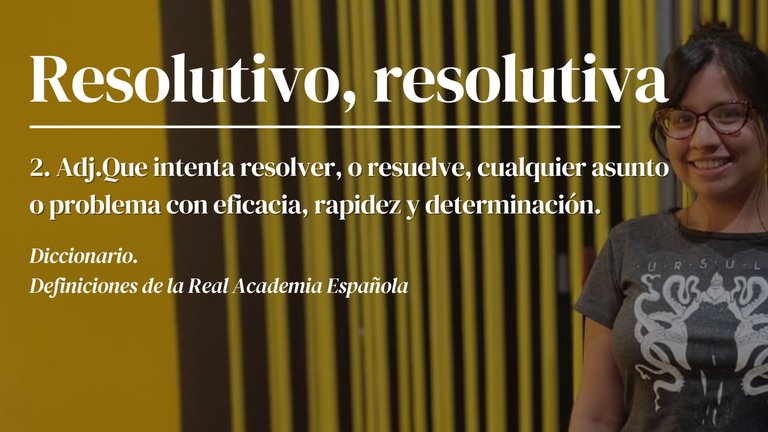
"El hombre que resuelve" es un meme que he visto en Redes Sociales. Si bien los memes no son tomados muy en serio por su visión satírica de la realidad, también es cierto que pueden llegar a propiciar debates muy interesantes, como en este caso en particular, por el matiz sexista del mismo. El debate ha llegado a tales puntos que algunas personas se han tomado la tarea de explicar en qué consiste "Resolver" y por qué, de hecho, las personas que "Resuelven" son subjetivamente más atractivas, consiguen pareja más rápido o mantienen relaciones estables a largo plazo.
Pero... El resolver ¿Solo aplica en el ámbito de las relaciones afectivas? ¿Qué es resolver? ¿Qué es ser resolutivo?
Miremos la segunda acepción de la RAE:
- Resolutivo, va.
Del lat. resolūtus, part. pas. de resolvĕre 'resolver', e -ivo.
Que intenta resolver, o resuelve, cualquier asunto o problema con eficacia, rapidez y determinación.
A partir de esta definición entendemos que, el ser resolutivo incluye tanto la intención como el lograr encontrar la solución a un determinado problema, teniendo en cuenta el tiempo necesario para llevar esa tarea acabo, la actitud y por supuesto, la efectividad de los resultados.
El ser resolutivo, desde el punto de vista psicológico está asociado a las estrategias de afrontamiento que emplea cada persona. Cuando se nos presenta un problema podemos elegir centrarnos en:
1.- La emoción: Podemos centrarnos en el origen emocional de la situación, con preguntas como "¿Cómo me siento?" "¿Qué me lleva a sentirme de esta forma?". Este camino será muy útil para comprendernos en medio de una situación, pero no necesariamente nos llevará a accionar y/o a encontrar una respuesta.
2.- El problema: Centrarnos únicamente en el problema puede ayudarnos a desglosarlo, separarlo y entenderlo en su totalidad. Por ejemplo, cuando realizamos una investigación, cuando sobrepensamos las situaciones, cuando solicitamos la opinión de diferentes personas. Es una visión enfocada en el pasado y en el presente, pero no en la consecución de un objetivo.
3.- La Solución: Implica un pensamiento flexible y creativo, dirigido a planificar y ejecutar diferentes acciones para resolver una determinada situación. Requiere de una actitud positiva y confianza en uno mismo.
Ser resolutivo implica una armonía entre el analizar y el accionar.
Se requiere del análisis porque si actuamos sin pensar y de forma aleatoria obtendremos resultados que no serán acordes a las situaciones identificadas. En el proceso nos agotaremos y consumiremos recursos de forma innecesaria. Es preferible realizar una pausa, pensar en las soluciones más viables para nuestro problema y aplicarlas.
Se requiere de la acción porque, aunque el pensar lleva tiempo y esfuerzo mental, no cambiamos nuestra realidad solo con analizar las diferentes formas de obtener algo. Es importante el elemento práctico. El abocarnos a la solución de un problema no quiere decir necesariamente que lo lograremos, pero al menos podemos descartar lo que no funciona y continuar intentándolo, eso también es parte del hacer.
Cada problema tiene un nivel de complejidad diferente y no todos requerirán de las mismas habilidades, sin embargo, es importante desarrollar nuestra capacidad de agencia pues, a través de ella, superamos obtáculos, tenemos una mayor confianza en nosotros mismos y sentimos una mayor satisfacción con la vida. No solo en relación con los demás sino también en la relación con nosotros mismos.
Para potenciar nuestra capacidad resolutiva recomiendo lo siguiente:
1.- Ejercicios de pensamiento creativo con distintos escenarios, de los más sencillos a los más complejos, donde evaluamos cuál sería nuestra respuesta ante ellos, cuáles posibles caminos de solución tenemos y por qué escogeríamos alguno de ellos.
2.- Análisis de la situación bajo un tiempo determinado: Determinar un tiempo límite para pensar e investigar más sobre la situación. Una vez pasado el tiempo, iniciar con la acción.
3.- Evaluación interna: ¿Cómo me siento cuando me enfrento a un problema? ¿Qué estrategias empleo? ¿Cuáles estrategias me gustaría aprender? ¿Cuáles circunstancias he sido capaz de resolver? ¿Cuáles situaciones me han superado?
4.- Aprendizaje continuo: Podemos aprender por ensayo y error, pero también podemos aprender a través de otras personas, videos en youtube, cursos o libros que amplíen nuestro repertorio de herramientas, que pueden ir desde cómo reparar una fuga de agua en un grifo hasta cómo manejar un conflicto con un ser querido.
4.- Práctica de habilidades mentales: Una forma fácil y divertida es a través de juegos de acertijos (Ingenio, Preguntados), estrategia (batalla naval) o matemáticos (Sudoku)
su publicación y, por supuesto, los invito a que participen en la iniciativa, compartiendo sus ideas y opinionesEspero esta información sea de mucha utilidad. Mi publicación responde a la iniciativa de @damarysvibra quien nos comparte en su blog información muy valiosa sobre el Ser Resolutivo. Recomiendo leer

Recursos bibliográficos:
Real Academia Española: Diccionario de la lengua española, 23.ª ed., [versión 23.7 en línea]. Disponible en https://dle.rae.es
Estrategias de Afrontamiento - Universidad ECCI [Video de youtube]

"El hombre que resuelve " is a meme that I have seen in Social Networks. Although memes are not taken very seriously because of their satirical vision of reality, it is also true that they can lead to very interesting debates, as in this particular case, because of the sexist nuance of it. The debate has reached such a point that some people have taken on the task of explaining what "Resolve" consists of and why, in fact, people who "Resolve" are subjectively more attractive, get a partner faster or maintain stable long-term relationships.
But... Does resolving only apply in the realm of emotional relationships? What is resolving? What is being resolute?
Let's look at the second meaning of the RAE:
- Resolutivo, va.
*From lat. resolūtus, pass. part. of resolvĕre 'to resolve', and -ivo.
That which attempts to resolve, or resolves, any matter or problem with efficiency, speed, and determination.
From this definition we understand that, being resolute includes both the intention and achievement of finding the solution to a given problem, taking into account the time needed to carry out that task, the attitude and of course, the effectiveness of the results.
From a psychological point of view, being problem-solving is associated with the coping strategies used by each person. When we are presented with a problem we can choose to focus on:
1.- Emotion: we can focus on the emotional origin of the situation, with questions such as "How do I feel?" "What makes me feel this way?". This way will be very useful to understand ourselves in the middle of a situation, but it will not necessarily lead us to take action and/or find an answer.
2.- The problem: Focusing only on the problem can help us to break it down, separate it and understand it as a whole. For example, when we carry out an investigation, when we overthink situations, when we ask the opinion of different people. It is a vision focused on the past and the present, but not on the achievement of an objective.
3.- The Solution: It involves flexible and creative thinking, aimed at planning and executing different actions to solve a given situation. It requires a positive attitude and self-confidence.
**Being decisive implies a harmony between analysis and action.
It requires analysis because if we act without thinking and in a random way we will obtain results that will not be in accordance with the identified situations. In the process we will exhaust ourselves and consume resources unnecessarily. It is preferable to pause, think of the most viable solutions to our problem and apply them.
Action is required because, although thinking takes time and mental effort, we do not change our reality just by analyzing the different ways of obtaining something. The practical element is important. Focusing on the solution of a problem does not necessarily mean that we will succeed, but at least we can discard what does not work and continue trying, that is also part of doing.
Each problem has a different level of complexity and not all will require the same skills, however, it is important to develop our capacity for agency because, through it, we overcome obstacles, have greater self-confidence and feel greater satisfaction with life. Not only in relation to others but also in relation to ourselves.
To enhance our capacity for resolution, I recommend the following:
1.- Exercises of creative thinking with different scenarios, from the simplest to the most complex, where we evaluate what would be our response to them, what possible solution paths we have and why we would choose any of them.
2.- Analysis of the situation under a determined time: Determine a time limit to think and investigate more about the situation. Once the time has elapsed, start with the action.
3.- Internal evaluation: How do I feel when I face a problem? What strategies do I use? What strategies would I like to learn? What circumstances have I been able to solve? What situations have overcome me?
4.- Continuous learning: We can learn by trial and error, but we can also learn through other people, youtube videos, courses or books that expand our repertoire of tools, which can range from how to repair a water leak in a faucet to how to handle a conflict with a loved one.
4.- Practice mental skills: An easy and fun way is through puzzle games (Ingenio, Preguntados), strategy (naval battle) or mathematical (Sudoku).
her publication and, of course, I invite you to participate in the initiative, sharing your ideas and opinions.I hope this information is very useful. My publication responds to the initiative of @damarysvibra who shares in her blog very valuable information about the Resolute Self. I recommend reading

Resources:
Real Academia Española: Diccionario de la lengua española, 23rd ed, [version 23.7 online]. Available at https://dle.rae.es
Estrategias de Afrontamiento - Universidad ECCI [youtube video]
Saludos amiga! No me canso de valorar tus post y buenas intervenciónes . . . Me ha encantado el desarrollo que le has hecho a esta expresión "Resolución" . . . El punto de hacer juegos como sudoku y preguntados genial . . . Felicidades Sofía.
Hola Luis 🤗 me alegra recibir este comentario positivo, me anima a continuar enfocada en aportar valor desde la psicología.
Efectivamente, podemos fortalecernos mentalmente a través de los juegos, y la mente es una pieza importante cuando de Ser resolutivos hablamos.
Un abrazo fuerte
Buenas noches @sofiaquino98, gracias por este gran aporte al tema y las sugerencias que nos has compartido 🙂
Gracias a ti, por proponer esta gran iniciativa y por tu amable comentario.
Un abrazo 🤗
Como siempre es un placer leerte, hija. Gracias por tan valiosa información y por las recomendaciones que nos dejas para potenciar la capacidad resolutiva. Dios te bendiga, mi vidita.
Gracias a ti por tu lectura y apoyo 😊 Para mi es un verdadero gusto desarrollar estos temas.
Hola amiga @sofiaquino, excelente Post y la forma en que explicas como se resuelve el problema.
Hola! gracias a ti por el tiempo dedicado a leer y comentar mi publicación. Un saludo y espero que esta información te sea de utilidad :)